|
|
|
Sort Order |
|
|
|
Items / Page
|
|
|
|
|
|
|
| Srl | Item |
| 1 |
ID:
124990
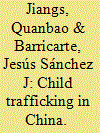

|
|
|
|
|
| Publication |
2013.
|
| Summary/Abstract |
Child trafficking is a serious problem in China. However, there has not been much research in this area. This article introduces the problem of child trafficking in China based on available data. First, the article examines the reasons for child trafficking followed by a summary description of the characteristics of the children who have been victims of trafficking. Next, the article analyzes the process of child trafficking and discusses the fate of the children involved. The article additionally provides a description of the various measures adopted by the Chinese government and NGOs (non-governmental organizations) to combat child trafficking and mentions the resistance to these measures. This article will hopefully draw the attention of the government, academia and the public to this issue.
|
|
|
|
|
|
|
|
|
|
|
|
|
|
|
|
| 2 |
ID:
128094
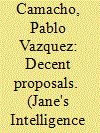

|
|
|
|
|
| Publication |
2012.
|
| Summary/Abstract |
Mexico's problems of violence and drug trafficking by organized crime groups have promoted demands fro change in security policy. Pablo Vazquez Camacho assesses the incoming president's plans for reform and tackling the causes of crime
|
|
|
|
|
|
|
|
|
|
|
|
|
|
|
|
| 3 |
ID:
127791
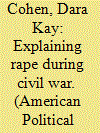

|
|
|
|
|
| Publication |
2014.
|
| Summary/Abstract |
Why do some armed groups commit massive wartime rape, whereas others never do? Using an original dataset, I describe the substantial variation in rape by armed actors during recent civil wars and test a series of competing causal explanations. I find evidence that the recruitment mechanism is associated with the occurrence of wartime rape. Specifically, the findings support an argument about wartime rape as a method of socialization, in which armed groups that recruit by force-through abduction or pressganging-use rape to create unit cohesion. State weakness and insurgent contraband funding are also associated with increased wartime rape by rebel groups. I examine observable implications of the argument in a brief case study of the Sierra Leone civil war. The results challenge common explanations for wartime rape, with important implications for scholars and policy makers.
|
|
|
|
|
|
|
|
|
|
|
|
|
|
|
|
| 4 |
ID:
126506
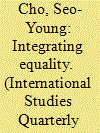

|
|
|
|
|
| Publication |
2013.
|
| Summary/Abstract |
This paper empirically investigates whether globalization can improve women's rights. Using panel data from 150 countries over the 1981-2008 period, I find that social globalization positively affects women's economic and social rights. When controlling for social globalization, however, economic globalization does not have any effect on women's rights. Despite the positive effect of (social) globalization on women's standing in a country, (marginalized) foreign women, proxied with inflows of human trafficking, are not beneficiaries of such "female-friendly" globalization effects.
|
|
|
|
|
|
|
|
|
|
|
|
|
|
|
|
| 5 |
ID:
129401
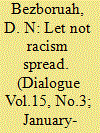

|
|
|
|
|
| Publication |
2014.
|
| Summary/Abstract |
On January 29 this year, Nido Tania, a 19-year-old student from Arunachal Pradesh studying in Delhi was beaten up with iron rods by some traders of Lajpat Nagar after an altercation with a shopkeeper who had made fun of the young student's hairstyle. The post-mortem report shows that his death was caused by severe head and lung injuries. The police have arrested six people whose bail applications have been
turned down. Considering the crime rate in Delhi, this would probably have been written off as just one of those things. After all, India's capital city is witness to several murders, rapes and robberies every day. However, the brutal killing of Nido Tania cannot be dismissed as just one of those things simply because one cannot run away from the fact that he was killed because of the accident of his birth-because someone from Arunachal Pradesh did not look like someone of his age from mainland India. And yet there could be no question of denying his Indian nationality and citizenship.
|
|
|
|
|
|
|
|
|
|
|
|
|
|
|
|
| 6 |
ID:
129402
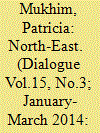

|
|
|
|
|
| Publication |
2014.
|
| Summary/Abstract |
At a time when the discourse among North-Easterners in Delhi is centred around the death of Nido Tania, a student from Arunachal Pradesh, and sharp remarks of racism are flying thick and fast, a central government limping on its last legs has responded with a typical knee jerk reaction by setting up a Committee to look into this so called 'racial prejudice' that visits people from the region regularly like the measles. The Committee comprises an all-male team of retired bureaucrats as if all the wisdom about social and racial prejudices resides with them. That the Home Ministry could notify those names of people of privilege who have never walked in the shoes of the ordinary North- Easterner shopping in the crowded sabzi mandi of Delhi is scandalous. In retrospect this seems like an attempt to quickly shut up the protests and assuage the anger of the people of the region studying, working or living in Delhi.
|
|
|
|
|
|
|
|
|
|
|
|
|
|
|
|
| 7 |
ID:
129233
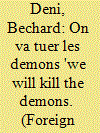

|
|
|
|
|
| Publication |
2014.
|
| Summary/Abstract |
Inside a small concrete church, lit by a few tungsten bulbs hanging from exposed wires, hundreds of people stood packed Together in stifling heat, repeating the words their pastor Bellowed into a microphone. It was after midnight in Kinshasa, the capital of the Democratic Republic of the Congo, but the service was just getting under way. The pastor, Pierre Pinda Buana, wore a simple, blue button-down shirt. Its acrylic shimmered as he moved around the center of the room--smooth, practiced, confident. For almost an hour, Pinda led his congregation through songs and chants, the fervor in the church mounting. Then he preached about the main event they had all come to witness: exorcism. Charles, a Congolese friend of mine, who asked that I not use his real name, translated Pinda's words from Lingala, a local language, to French. But the cries, clapping, and ululations of the crowd often drowned out his voice. Pinda began describing a demon that was living in the body of a woman who stood before him, almost entirely blocked from my sight by the crowd: "It's attacking the heart. It's attacking the stomach. It strikes faster than an arrow." He called out to the demon, asking why it wanted to kill the woman. Electrical contacts crackled--I glimpsed a church assistant crouched over a fuse box in the rear doorway--and the bulb dangling above Pinda went dark. Light fell inward from the corners of the room, yellow and angular. Suddenly, the woman collapsed onto the ground and began shouting. The crowd pressed in around her as she writhed and arched her back.
|
|
|
|
|
|
|
|
|
|
|
|
|
|
|
|
| 8 |
ID:
129230


|
|
|
|
|
| Publication |
2014.
|
| Summary/Abstract |
H ARGEISA, Somalia - Mowlid Ahmed Abidoon stands quietly in the small prison cell where he has lived for nearly two years. Slot windows on one wall let in only a little sunlight, leaving his face almost entirely obscured in darkness. Yet there are splashes of color all around: The room's bunk beds are covered in sheets with bright floral and geometric patterns, over which hang canopies of blue mosquito nets -- cells within the cell. Clad in a striped polo shirt and prison-uniform pants, Mowlid estimates that he is about 20 years old; the last traces of baby fat still cling to his cheeks. He insists that he shouldn't be behind bars. "I'm a fisherman, not a pirate," he says flatly, as though he has delivered this speech a hundred times before. Court documents from Seychelles say otherwise. On Dec. 6, 2009, Mowlid and a band of fellow Somali pirates used firearms and explosives to attack the Topaz, a Seychelles Coast Guard patrol vessel. (Seychelles, an island nation, is about 825 miles southeast of Mogadishu, Somalia's coastal capital.) They were arrested, convicted, and sentenced to 24 years in prison.
|
|
|
|
|
|
|
|
|
|
|
|
|
|
|
|
| 9 |
ID:
129581
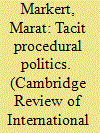

|
|
|
|
|
| Publication |
2014.
|
| Summary/Abstract |
This article analyses the dynamics of procedural politics in the EU's Police and Judicial Cooperation in Criminal Matters across subsequent Treaty regimes (Amsterdam and Lisbon). In the course of legislative policy-making in this area, member states and the European Commission engage in strategic interactions with respect to procedural rules, whereby specifically member states attempt to contain integrationist legislation coming from the Commission through legislative preemption strategies. Drawing on Joseph Jupille's procedural politics approach, the article hypothesizes that member states' strategies are conditioned by several scope conditions, notably jurisdictional ambiguity, influence difference between different decision-making procedures, and prointegrationist case law from the European Court of Justice. I test these hypotheses by analysing the legislative process on a number of selected cases.
|
|
|
|
|
|
|
|
|
|
|
|
|
|
|
|
| 10 |
ID:
134102
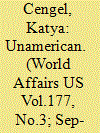

|
|
|
|
|
| Publication |
2014.
|
| Summary/Abstract |
They are not the most sympathetic characters. Veasna Sany goes by her former gang name "China." She has been convicted of possession and sale of cocaine, battery, and prostitution. Gnan "Mikki" Kroeung's convictions include terrorist threats and possession of a firearm. "Pich," a former methamphetamine addict, was caught engaging in credit card fraud. They all served time in US prisons and would now be home with their families in Philadelphia and Long Beach-if they were American citizens. But they aren't. They are legal permanent residents of the United States who have been deported to Cambodia, a country their parents fled before they were born.
|
|
|
|
|
|
|
|
|
|
|
|
|
|
|
|
| 11 |
ID:
129403
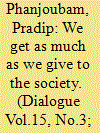

|
|
|
|
|
| Publication |
2014.
|
| Summary/Abstract |
The New Year 2014 is already a month old. The important question for beleaguered Manipur is, would this new beginning have ushered in the start of a fresh year in the true sense of the word? Or would the same vested interests who today have a vicelike grip on the affairs of Manipur, ensure that the dreadful Limbo of the past few decades continues to determine and define life in the State
|
|
|
|
|
|
|
|
|
|
|
|
|
|
|
|
| 12 |
ID:
125313
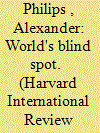

|
|
|
|
|
| Publication |
2013.
|
| Summary/Abstract |
Children starve. Young girls sell their bodies to eat. There is no clean drinking water. There are no doctors. Refugees are not allowed to leave the camps. As the rainy season approaches, waterborne diseases will spread like wildfire. This is the plight of the over 200,000 Rohingya who survive in makeshift refugee camps along the Myanmar's border with Bangladesh. Although their situation is dire, they are better off than the Rohingya being slaughtered back in Myanmar. According to the United Nations, the Rohingya are the world's most ignored and persecuted minority. They have faced decades of neglect and dehumanization while the world stands by; it is time for the response of the international community to change. The situation in Myanmar has reached a tipping point and the country is a tinderbox, ready to ignite into violence. The inaction of the international community has allowed the persecution of the Rohingya Muslim minority to escalate into state-sponsored ethnic cleansing and a spreading humanitarian crisis in Myanmar's western Rakhine state
|
|
|
|
|
|
|
|
|
|
|
|
|
|
|
|
| 13 |
ID:
129277
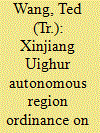

|
|
|
|
|
| Publication |
2012.
|
| Summary/Abstract |
The article offers information regarding the Xinjiang Uighur autonomous region, China, ordinance on the comprehensive management of social order. It also mentions that the main tasks of comprehensive management of social order include taking precautions against various illegal and criminal activities, suppress illegal religious activities, and to take actions for social security.
|
|
|
|
|
|
|
|
|
|
|
|
|
|
|
|
|
|
|
|
|